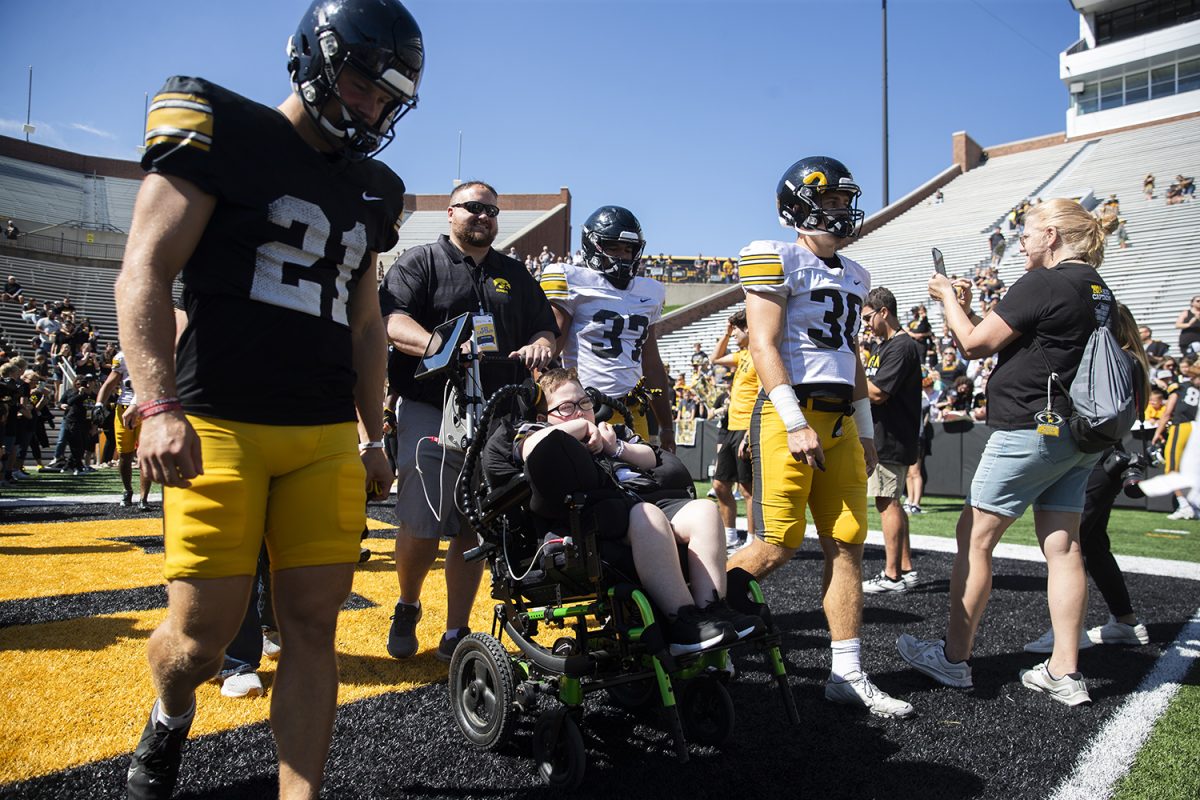While Jackson Casteel is non-verbal, the 7-year-old boy still makes his voice heard — and that voice is uniquely his. The boy from Panora, Iowa, has an augmented and alternative communication, or AAC, device mounted on the headrest of a wheelchair with a tablet that essentially serves as a sounding board for his personality. All he has to do is tap his head against a certain button, and his “Jacksonisms” are loud and clear.
Just saying, “Hello,” doesn’t cut it for Jackson. Instead, it’s, “Heyya.”
Neither does “Goodbye,” which is replaced with “See you later, gator.”
“It’s been really fun to see him be able to unlock that piece of himself and express himself more and more every year,” Jackson’s mother Sara said.
Coupled with Jackson’s joyous character is an ardent passion for the Hawkeyes. His AAC was recently equipped with a cheering section, allowing the boy to say “Go Hawks” as many times as he pleases. Such will come in handy on Saturday when Jackson will serve as the Kid Captain for Iowa football’s matchup against Washington.
For Sara, her son has been a fighter ever since he came out of the womb. Born premature after just 34 weeks, Jackson was diagnosed with an unknown genetic disease and brain bleeds, which Sara said caused some neurological complications. She explained how doctors in Des Moines told her that Jackson was unlikely to make it to term, and even if he did, would have a small chance of surviving.
“We were prepared for the worst situation, but we said, ‘If he shows us that he wants to fight, then please fight for him,’” Sara remembered. “That was our biggest thing.”
So when Jackson was born screaming and crying, his mother wasn’t only surprised but encouraged. Jackson spent six weeks in the neonatal intensive care unit before transferring to the University of Iowa Stead Family Children’s Hospital. There Sara and her husband Ross met their doctor, Amy Calhoun, who Sara said bore a wide smile as she delivered an inspiring message.
“She said, ‘Here’s the deal. Jackson’s never read the textbooks. He doesn’t know what he’s not supposed to do. He’s just living his life.’ And that really resonated with us, and we’ve kept that in the back of our minds as we’ve gone down this journey.”
Doctors at UIHC performed further genetic testing, and at 10 months old, Jackson was diagnosed with a rare genetic condition called Chondrodysplasia Punctata X-Linked Recessive Type 1, also known as CDPX1. The condition is a form of dwarfism estimated to affect 150 males worldwide.
As Jackson grew up, specialists found other results from his brain bleeds – these being spastic quad cerebral palsy, cortical vision impairment, and optic nerve hypoplasia. Jackson attends a school for the blind in addition to his general education in Panora, Iowa.
After spending a majority of his first two years of life in a hospital, Jackson is now what his mom calls “maintenance mode,” checking in with specialists every 3-6 months to ensure no additional complications to his genetic condition. Sara said Jackson has become more medically stable over the years and hit several milestones, including the ability to wave his arms, nod his head, and help himself up from lying down.
In his free time, the second-grade Jackson has fun through accommodations built by his parents, who each grew up on farms and are handy with tools. A mechanic in his younger years, Ross helped craft toys Jackson could play with despite his son’s limited hand-eye coordination.
Playing T-ball, all Jackson has to do is press a button, and the bat swings for him. A fishing pole attached to his wheelchair allows him to go fishing with his dad. Timber Creek Charities and Therapies offers horseback riding for Jackson, something his mom thought he would never be able to do.
Through all of his various activities, Sara said Jackson “carries the party with him,” loving to be around others and travel to new places. When he first met Iowa’s mascot Herky at Kids’ Day at Kinnick in August, Jackson broke down in tears of joy.
“Jackson’s a very complex kid, but he doesn’t know any different and is just living his life,” Sara said. “For all intents and purposes, he’s thriving for a kid who’s not supposed to be here.”
The day before the Iowa-Washington game, Jackson and his family will deliver adaptive and traditional toys to UIHC as part of a toy drive for the hospital. The Casteels have a nonprofit called Adaptive Designs, which Sara said aims to help families modify toys rather than pay for expensive toys with accommodations. She said last year Adaptive Designs helped 200 families.
“Our day-to-day life looks different, but I wouldn’t know what to do with a quintessential, ‘normal,’ typical kid,” Sara said. “Jackson has influenced our family and our friends in so many different ways.”



